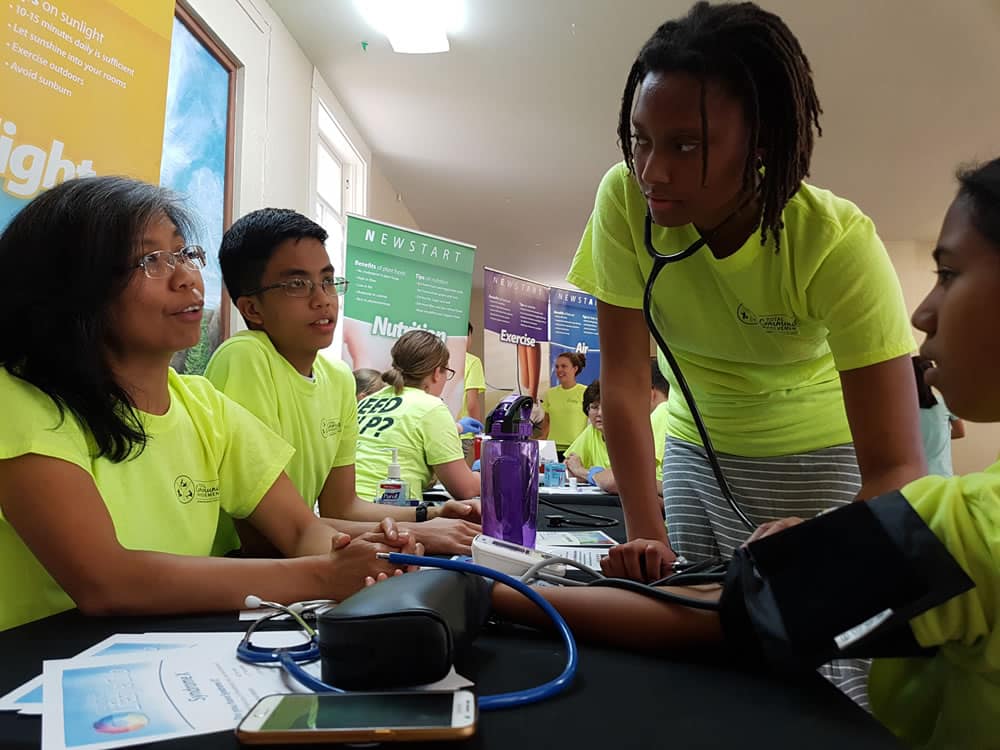Student and Community Feedback
We know that things have seemed a bit quiet for Weimar Institute on social media lately but we’ve had so much going on that we’re just now catching up!

For the past two Wednesdays, the majority of Weimar college students stayed on campus for community surveys and health expo training as part of their Total Community Involvement (TCI). This is in preparation for our first campus-hosted community health expo this school year scheduled for Sunday, September 17. Last week the students separated into two groups with half going to the community surveys training and the other half going to the health expo training. This past Wednesday, the groups switched so that every student received training in both types of ministry.
As TCI progresses, our college students are noting TCI’s impact on them personally. During our sharing time on Wednesday evenings, comments have included:
“[We learned the saying,] To know, to go and to show. That was really powerful to me in knowing how to share…First, I need to know it myself, then I need to do it and then I can show other people effectively.”
“I was part of the health expo training. It came to me how blessed I am and each of us are to be at a place where we can gain practical skills to better ourselves but ultimately to be a blessing to other people.”

“One thing that I thought was very special was to be on a project like this not only with my classmates and friends but also with some of the faculty and professors here. [I worked side-by-side with my Chemistry professor outside of a lab doing yardwork.] These are simple blessings we enjoy at Weimar and I thank God for that today.”
As referenced in the last student comment, three groups did go out into the community to work on previously promised projects. One team had an initial meeting and visitation time at a mental health residential center. A second group cleaned the yard of an elderly man who was scheduled for surgery. A third group started an on-going yardwork project for a woman who had been the primary caregiver for three family members who eventually died of cancer. She now faced a surgery herself and could not maintain her property alone.
For TCI Director Narlon Edwards, the training and the teamwork between staff and students are both essential to TCI. “We want everybody to be well versed in all TCI ministries so they can be fully independent in the different territories to which they’ll be assigned,” he shared. Likewise, “staff and student working together is a very important element because that is how Jesus did his training,” he added.

TCI feedback has come not only in the form of student comments but in the comments of those who are grateful for what Weimar Institute offers. An elderly man in attendance one Wednesday night thanked the students for splitting logs. Now he and his wife have a good supply of wood for the winter.
We’re hearing more grateful feedback from the community each week. Narlon related a recent conversation he had with a community member about the benefits she had received. When Weimar’s TCI program made the front page of the local newspaper, Narlon looked for additional copies to purchase for those on campus. However, it seemed most places were sold out. He stopped by a gas station, bought the two on display and then asked the clerk if there were more in the back.
The clerk asked, “Why are you so interested in the paper?” Narlon then shared about TCI and Weimar Institute, explaining that the students go out into the community on Tuesdays, Wednesdays and Thursdays. She stopped him and said, “I go to the clinic there. In addition to that, I want to let you to know I’m plant-based.”
Narlon asked, “Why are you plant-based?” She replied, “I went to the clinic and I was overweight. [With the information, I learned at the clinic about a plant-based diet and health] I’ve already lost 49 pounds. I was severely depressed because I was overweight. Now I’ve lost the weight so I’m no longer depressed.” She continued, “In addition, I was pre-diabetic and because I went plant-based, I’m not longer pre-diabetic. I was hypertensive. I need to get my final results but based on how my vitals have been, I am not in a hypertensive mode any more. Also, my mind used to be so clogged and foggy, I couldn’t think straight. Now I can think more. I’m more energetic [too],” she concluded.

These are just a few of the ways TCI and Weimar Institute are meeting needs among students, staff and the community. We’ll bring you more stories of the TCI impact next week.
